Related Research Articles

The flag of Pakistan traces its current form back to a meeting of the Constituent Assembly of Pakistan on 11 August 1947,three days before the Partition of India,when it was adopted by the All-India Muslim League as the official flag-to-be of the Dominion of Pakistan. It was retained upon the establishment of a constitution in 1956,and remains in use as the national flag for the present-day Islamic Republic of Pakistan. The flag is made up of a green field with a stylized tilted white crescent moon and five-pointed star at its centre,and a vertical white stripe at its hoist-end. Though the specific shade of green on the flag is mandated only as 'dark green',its official and most consistent representation is in Pakistan green,which is shaded distinctively darker.

Mir Zafarullah Khan Jamali was a Pakistani politician who served as the 15th prime minister of Pakistan from 2002 until his resignation in 2004. He was the first and only elected prime minister from Balochistan,Pakistan.

The prime minister of Pakistan is the head of government of the Islamic Republic of Pakistan. Executive authority is vested in the prime minister and his chosen cabinet,despite the president of Pakistan serving as the nominal head of executive. The prime minister is often the leader of the party or the coalition with a majority in the lower house of the Parliament of Pakistan,the National Assembly where he serves as Leader of the House. Prime minister holds office by virtue of their ability to command the confidence of the National Assembly. The prime minister is designated as the "Chief Executive of the Islamic Republic".
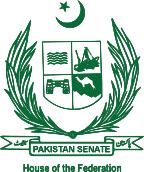
The Senate of Pakistan or Aiwān-e-BālāPākistān,constitutionally House of the Federation is the upper legislative chamber of the bicameral parliament of Pakistan. As of 2023,It has a total of 100 seats,of which 92 are elected by the provincial legislatures of Pakistan,with equal representation of 23 seats for all provinces,using indirect single transferable votes,while 4 represent the Federal Capital and the remaining 4 are representing FATA,until membership expiration in 2024. Elections are held every three years for one half of the house,each Senator has a term of six years. Unlike the National Assembly,the Senate is a continuing chamber and hence not subject to dissolution.

The Parliament of Pakistan is the federal and supreme legislative body of Pakistan. It is a bicameral federal legislature that consists of the Senate as the upper house and the National Assembly as the lower house. According to the Constitution of Pakistan,the President of Pakistan is also a component of the Parliament. The National Assembly is elected for a five-year term on the basis of adult franchise and one-man one-vote. The tenure of a Member of the National Assembly is for the duration of the house,or sooner,in case the Member dies or resigns. The tenure of the National Assembly also comes to an end if dissolved on the advice of the Prime Minister or by the president in his discretion under the Constitution.

Since its establishment in 1947,Pakistan has had an asymmetric federal government and is a federal parliamentary democratic republic. At the national level,the people of Pakistan elect a bicameral legislature,the Parliament of Pakistan. The parliament consists of a lower house called the National Assembly,which is elected directly,and an upper house called the Senate,whose members are chosen by elected provincial legislators. The head of government,the Prime Minister,is elected by the majority members of the National Assembly and the head of state,the President,is elected by the Electoral College,which consists of both houses of Parliament together with the four provincial assemblies. In addition to the national parliament and the provincial assemblies,Pakistan also has more than five thousand elected local governments.

Maulana Fazal-ur-Rehman is a Pakistani Islamic fundamentalist politician who is the president of Jamiat Ulema-e-Islam (F). He is also the president of the Pakistan Democratic Movement (PDM),a coalition of political parties which ousted then prime minister Imran Khan through a no-confidence motion in 2022. He was a member of the National Assembly between 1988 and 2018,and the Leader of the Opposition from 2004 to 2007. He is a supporter of the Taliban government in Afghanistan and has demanded for its international recognition. In the 1980s,he was part of the Movement for the Restoration of Democracy (MRD),which was formed to end the military regime of General Zia-ul-Haq.
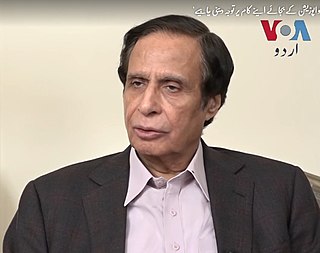
Chaudhry Pervaiz Elahi is a Pakistani politician who is the former Chief Minister of Punjab when he,as Chief Minister,had dissolved the Assembly. He had been a member of the Provincial Assembly of the Punjab from August 2018 till January 2023. In 2023,he left the Pakistan Muslim League (Q) and joined Pakistan Tehreek-e-Insaf (PTI) and was appointed its president along with his son,Moonis Elahi,and other ten former PML(Q) MPAs over political rifts with the party president,Chaudhry Shujaat Hussain. He was the former president of the Punjab Division of the PML(Q).

Hangu District is a district in Kohat Division of Khyber Pakhtunkhwa province in Pakistan. The district takes its name from the town of Hangu,which is its administrative centre. The name Hangu may also sometimes be applied to the Miranzai Valley which is partly within the district,bordering the Samana Range.
Omar Ayub Khan is a Pakistani politician. He was the last Federal Minister for Economic Affairs under the Prime Ministership of Imran Khan from April 2021 until April 2022. He previously served as Federal Minister for Energy from 11 September 2018 to 16 April 2021. He had been a member of the National Assembly of Pakistan from August 2018 till January 2023. He is the grandson of the former President of Pakistan,Field Marshal Ayub Khan. Previously,he served as a member of the National Assembly from 2002 to 2007 and again from 2014 to 2015. He also served as the Minister of State for Finance in the federal cabinet from 2004 to 2007.
Akram Khan Durrani is a Pakistani politician who was the Leader of the Opposition in the Provincial Assembly of Khyber Pakhtunkhwa,in office from 2 October 2018 till 18 January 2023. He previously served as the Chief Minister of Khyber Pakhtunkhwa from 2002 to 2007. He served as Federal Minister for Housing and Works,in the Abbasi cabinet from August 2017 to May 2018 and as the Federal Minister for Housing and Works in the third Sharif ministry from June 2013 to July 2017. He was a member of the National Assembly of Pakistan from June 2013 to May 2018 from NA-26 (Bannu).
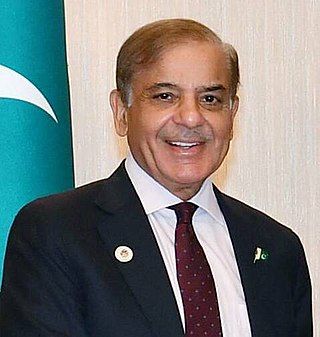
Mian Muhammad Shehbaz Sharif is a Pakistani politician and businessman who is currently serving as the 23rd Prime Minister of Pakistan,in office since 11 April 2022. He is the current president of the Pakistan Muslim League (N) (PML-N). Previously in his political career,he served as the Chief Minister of Punjab three times,making him the longest-serving Chief Minister of Punjab.

Aftab Ahmad Khan Sherpao is a Pakistani politician who is the current chairman of the centre-left Pashtun nationalist Qaumi Watan Party,after previously being a member of the Pakistan Peoples Party. He was a member of the National Assembly of Pakistan from November 2002 to May 2018.
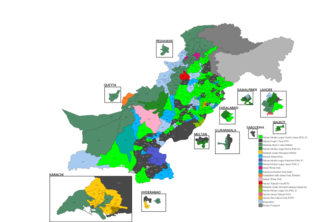
General elections were held in Pakistan on 10 October 2002 to elect the 12th National Assembly and four Provincial Assemblies. The elections were held under the military government of Pervez Musharraf. The two mainstream parties,Pakistan Peoples Party (PPP) and Pakistan Muslim League (N) (PML-N) had several restrictions imposed on them and their leaders Benazir Bhutto and Nawaz Sharif were in exile. In order to address the restrictions,PPP created the Pakistan Peoples Party Parliamentarians (PPPP) under the leadership of Ameen Faheem,to contest the elections on its behalf. The PML-N meanwhile,suffering from the party's division into two factions:one that remained loyal to Sharif and were contesting the elections under the leadership of Javed Hashmi,and the other which had broken away to form the pro-Musharraf Pakistan Muslim League (Q) (PML-Q) under the leadership of Mian Muhammad Azhar. The emergence of the PML-Q marked the beginning of multi-party politics in the country,bringing an end to the decade-long two-party system between the PPP and PML-N.
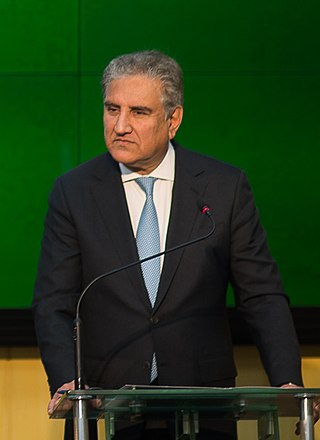
Makhdoom Shah Mahmood Hussain Qureshi is a Pakistani politician who served as the 29th Minister of Foreign Affairs from 2018 to 2022. He previously held the post from 2008 to 2011. He had been a member of the National Assembly from August 2018 till January 2023. He is the vice chairman of the Pakistan Tehreek-e-Insaf political party since December 2011. Previously,he was a member of the National Assembly from 2002 to May 2018.
Abdus Sattar Khan Niazi was a Pakistani religious and political leader.
Sardar Ali Mohammad Khan Mahar;12 January 1967 –21 May 2019) was a Pakistani politician who served as the 25th Chief Minister of Sindh from 2002 to 2004 and then as the Federal Minister for Narcotics Control between 2018 and 2019.
Mian Ghulam Sarwar Khan is a Pakistani politician who was the former Federal Minister for Aviation,in office from 24 May 2019 to ?. Prior to this position,he was appointed as Federal Minister for Petroleum on 20 August 2018,but he was shifted to the Aviation Ministry. He had been a member of the National Assembly of Pakistan,from August 2018 till January 2023. Previously,he was a member of the National Assembly from 2002 to 2007 and again from June 2013 to May 2018. He remained a member of the Provincial Assembly of the Punjab from 1985 to 1996. Then he

Jahangir Khan Tareen is a Pakistani businessman and politician who is the majority shareholder and CEO of JDW Group,a conglomerate specialised in sugar manufacturing,biomass (bagasse) cogeneration,paper manufacturing,sugarcane farming,and aviation services. Jahangir Tareen is also the chairman and owner of JK Group,a conglomerate specialised in sugar manufacturing,milk production and processing,and sugarcane farming. He is also the chairman and owner of United Foods Pvt Ltd and Indus Mining. Khan has been a member of the National Assembly of Pakistan thrice between 2002 and 2017. Born in Comilla,Tareen was educated at the Forman Christian College in Lahore,and later attended the University of North Carolina. Prior to entering politics,he had been a lecturer and banker.
References
- ↑ "12TH NATIONAL ASSEMBLY FROM 2002 TO 2007" (PDF). www.na.gov.pk. Retrieved 14 November 2019.